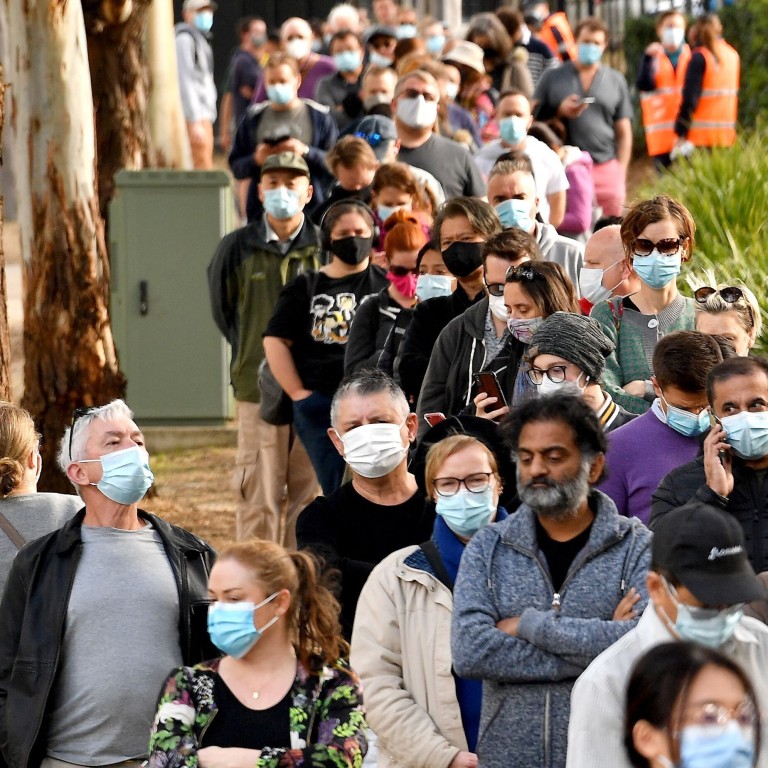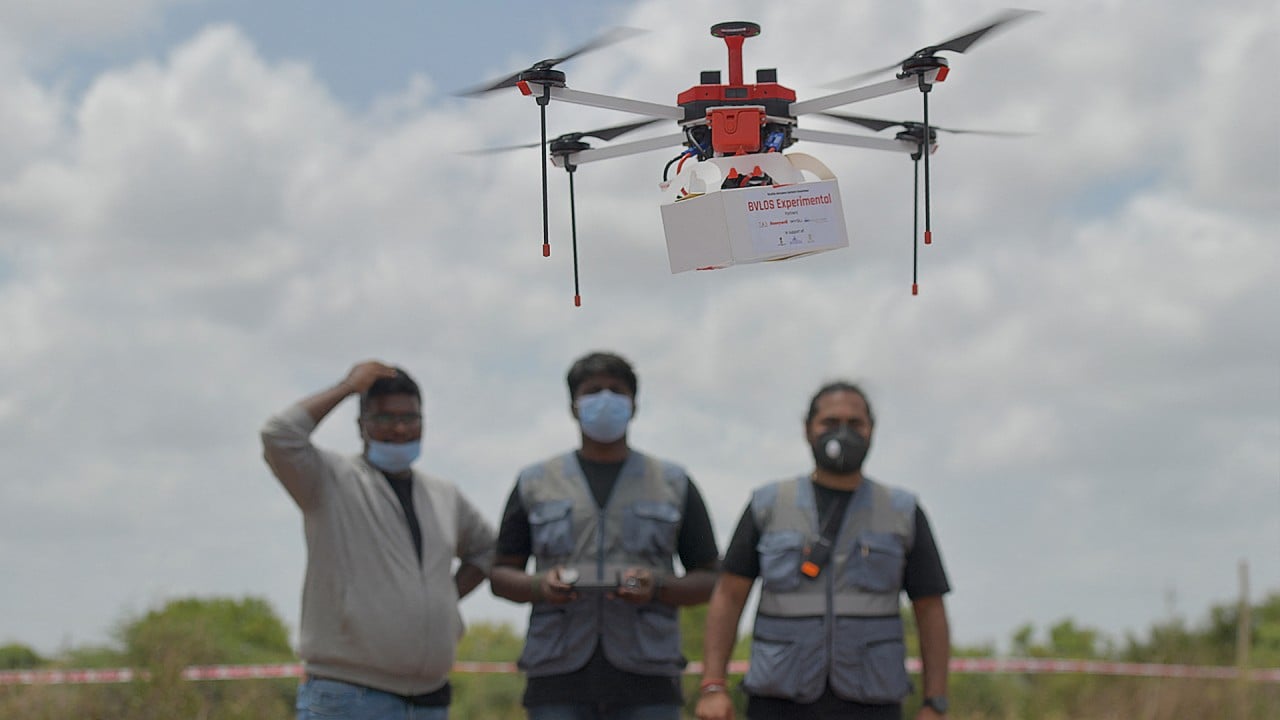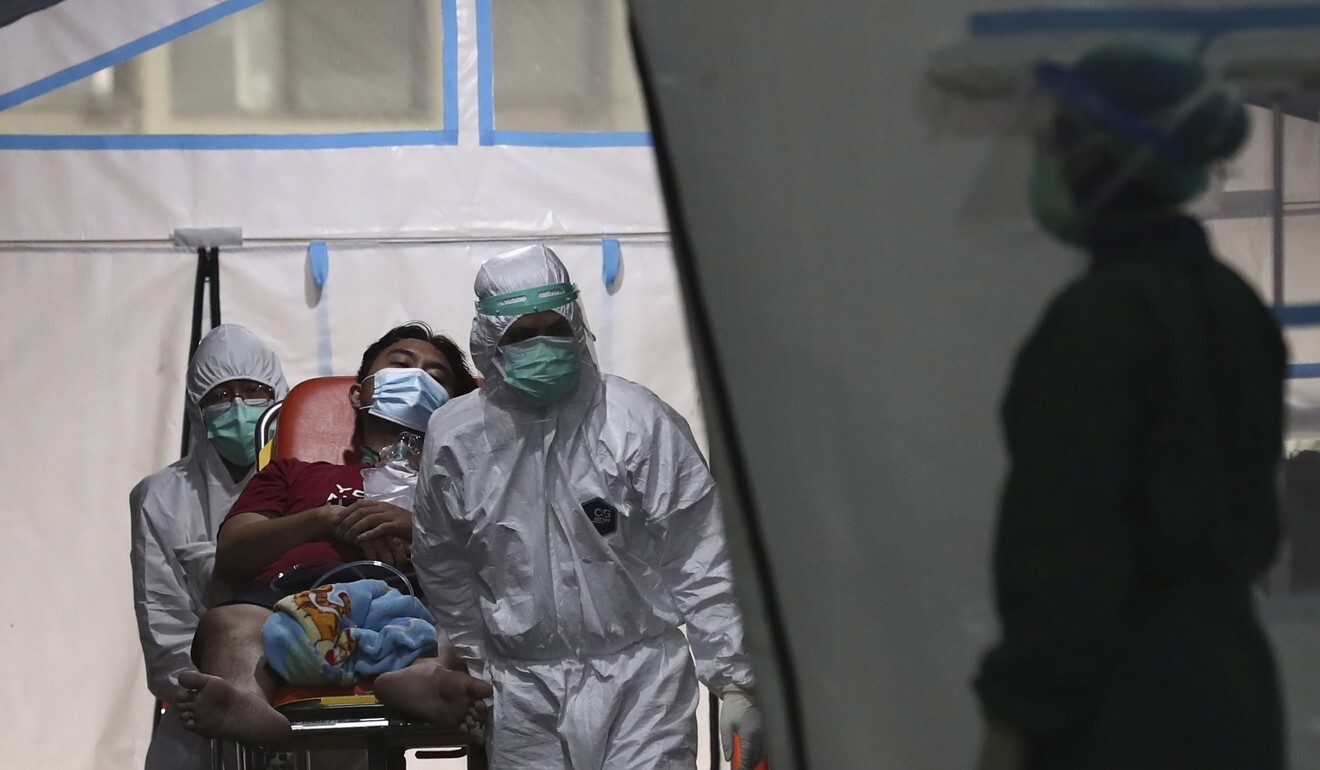
Coronavirus: Sydney in lockdown as Delta variant spreads; record vaccinations may not stop India’s third wave
- People in downtown Sydney and the city’s eastern suburbs are allowed to leave their homes only for essential work, medical reasons or outdoor exercise
- Elsewhere, Japan will provide 1 million doses of the AstraZeneca vaccine each to Taiwan, Thailand, Malaysia and Indonesia
People who live or have worked in the four local government council areas in Sydney in the last two weeks have been ordered to stay at home except for urgent reasons, New South Wales (NSW) state Premier Gladys Berejiklian told reporters in Sydney.
People are allowed to leave their homes only for essential work or education, medical reasons, grocery shopping or outdoor exercise.
“We don’t want to see this situation linger for weeks, we would like to see this situation end sooner rather than later,” Berejiklian said.
Twenty-two local cases were reported on Friday, the biggest rise in infections since the first case was detected in Bondi last Wednesday in a limousine driver who transported an overseas airline crew.
Surge of Delta variant in Indonesia threatens Bali tourism reopening
Officials have issued health alerts overnight for more than a dozen new venues scattered across Sydney, as total infections in the outbreak topped 60.
NSW has held off calls for a hard lockdown, instead imposing mandatory masks in all indoor locations in Sydney, including offices, restricted residents in seven council areas from leaving the city and limited home gatherings to five.
These restrictions, which were expected to end on Wednesday, are now extended until midnight on July 2.
Australian Medical Association President Omar Khorshid said the latest restrictions were “not quite enough” and urged officials to place the entire city under lockdown to avoid the virus spreading across the country.
Khorshid warned officials the latest Sydney outbreak could get out of control and reminded officials the devastating wave of Covid-19 in Melbourne last year, which resulted in more than 800 deaths.
“What happened in Melbourne is they tried last year to get ahead slowly and were not able to get ahead of it and it resulted in deaths … that must not be allowed to happen in Sydney,” Khorshid said.
The outbreak has prompted New Zealand Prime Minister Jacinda Ardern to postpone her trip to Australia scheduled in early July. “We are deferring the PM’s trade mission until later in the year,” a spokesperson for Ardern said.
Swift contact tracing, strict social distancing rules and a high community compliance have largely helped Australia quash prior outbreaks and keep its Covid-19 numbers relatively low, with just under 30,400 cases and 910 deaths.
NSW has been effectively isolated from the rest of the country after other states reinstated tough border rules in response to the latest outbreak, including a total ban for visitors from Sydney’s virus-hit suburbs.
Queensland stopped 186 passengers who attempted to enter the state by air and were sent back to Sydney, state Deputy Premier Steve Miles said in a press conference on Friday.
Record vaccinations may not stop India’s third wave
But even this unprecedented pace may not be fast enough for a country just emerging from a devastating second wave to head off a third one, experts say. They also question whether this week’s push averaging about 4.6 million doses a day, up from about 3 million for most of the past month, can be sustained.
“I don’t think the recent spurt can be maintained, given what we know of the supply situation,” said Gautam Menon, a professor of physics and biology at Ashoka University, who also works on modelling outbreaks. “The single-day spike seems to have been the result of a concerted effort by some states, who may have stockpiled doses for this purpose. We would need to get to about 10 million doses per day to ensure that a future wave is less potent.”

01:58
India tests long-range drone flights to deliver coronavirus vaccines
India’s challenges in accelerating its inoculation drive are considerable. The fewer than 100 million doses per month being currently pumped out of two local manufacturers are struggling to cover its nearly 1.4 billion people. There is also considerable hesitancy to overcome and logistical hurdles to reaching much of the countryside, where more than two-thirds of Indians live.
Still some researchers are sceptical and took to social media to criticise the sudden spurt. Chandrakant Lahariya, a New Delhi-based epidemiologist and co-author of a book on India’s battle against Covid, called it “an overzealous attempt” to hit a record that would drain limited stocks.
Rijo M. John, a health economist and adjunct professor at the Rajagiri College of Social Sciences in Kochi, said on Twitter that “the chest-thumping must officially end now,” because India doesn’t have enough doses in the short term to continue hitting those same levels.
Can India’s international students escape a web of visa delays and travel bans?
Modi’s generosity belied a stuttering roll-out at home as lower-than-anticipated batches came off the production lines at the Serum Institute of India, the world’s largest vaccine manufacturer, and Bharat Biotech International, India’s other main provider. Both companies have promised to bolster output starting in July. However, Serum’s chief executive officer, Adar Poonawalla, said last month that exports aren’t expected to resume until the end of the year, a blow for many poorer nations depending on Indian supplies.
The Indian launch of Russia’s Sputnik V has also been slow. Despite receiving shipments from Russia last month, Dr Reddy’s Laboratories, the local distributor, is still going through a small-scale pilot launch of the vaccine, a spokesperson said.
If an average pace of about 3.2 million daily doses is maintained, India will be able to vaccinate 45 per cent of its adult population by year-end and 60 per cent by the end of March 2022, Anubhuti Sahay and Saurav Anand, South Asia economists at Standard Chartered, wrote in a report on Wednesday. They said that if more vaccines become available and the pace increases by 30 per cent, India could fully immunise 55 per cent by the end of 2021.
Japan to give more vaccines to Taiwan, Southeast Asia
He added that arrangements were also being made to send 1 million doses each of AstraZeneca vaccine to Thailand, Malaysia, Indonesia and the Philippines.
Can Japan counter China’s vaccine diplomacy with Southeast Asia donations?
Taiwan’s foreign ministry expressed its thanks to Japan’s government, saying details would be forthcoming.
“It is obvious that the road to fighting the epidemic may be long, but Taiwan is not alone,” it said.
A Taipei-based official familiar with Japan’s two vaccine donations said while Tokyo has been subtle in its offers, mainly focusing on Taiwan’s urgent medical need, there was a broader message.
The donations are actually an “important move” to echo the US campaign of a free and open Indo-Pacific to counter China’s geopolitical clout in the region, the person said, speaking on condition of anonymity.
Taiwan has accused China of blocking its access to foreign vaccines, which Beijing strongly denies.
Japan’s latest gift will boost Taiwan’s vaccine arsenal to 4.74 million doses, and help speed up a immunisation programme that has been hampered by global supply shortages, though the island has millions of doses on order.
Only around 7 per cent of Taiwan’s 23.5 million people have received at least one shot of the two-dose regimen.
Jakarta hospitals resort to tents in hunt for beds
The world’s fourth most populous nation reported that overall coronavirus cases topped 2 million this week, while Thursday’s 20,574 rise in infections was the biggest since the start of the pandemic.
The virus surge has piled pressure on a fragile health care system, with hospitals in some cities nearing full capacity, while hundreds of health care workers have tested positive for the respiratory disease and at least 10 who were fully vaccinated have died.
“How long this pandemic is going to be around comes down to all of us,” Health Minister Budi Gunadi Sadikin told a streamed briefing on Friday.

In the capital Jakarta, the isolation bed occupancy rate hit 90 per cent on Wednesday, while the intensive care unit rate was at 86 per cent, according to Governor Anies Baswedan.
Three hospitals in Jakarta are being converted to exclusively handle Covid-19 patients, while two isolation centres were being set up to house an additional 7,000 beds, the health minister said.
Allaying fears over possible oxygen shortages for patients, he said supplies were sufficient and the state electricity company had been instructed to ensure that power at oxygen plants remained on after a recent outage in Central Java.
Indonesia risks India-style Covid-19 surge as millions skirt Eid travel ban
The number of coronavirus deaths has been rising again and on Tuesday the 143 Covid-19 burials in Jakarta was the highest daily number, according to the city’s parks department.
Earlier this week, the government introduced tighter restrictions in designated red zone areas, cutting office capacity and opening hours of restaurants or malls.
But so far President Joko Widodo has resisted calls from health experts for full lockdowns and said on Wednesday current restrictions were the best option because they could be implemented without “killing” the economy.
Fiji admits Covid-19 community transmission
Fiji health chiefs have admitted for the first time that Covid-19 transmission is widespread in the community after the Pacific nation recorded more than 300 new daily cases.
But authorities continue to reject calls for a nationwide lockdown, saying the 930,000-strong population’s failure to obey health rules designed to contain the virus would render it ineffective.
Permanent Secretary for Health James Fong announced late on Thursday that Fiji had recorded 308 new daily virus cases, taking the total number in a second wave of infections that began in April to almost 2,800.
Fong acknowledged calls for a lockdown but said Fiji’s public compliance was low and authorities had no ability to enforce it, particularly in the densely populated shantytown settlements that were at most risk.
“The tragic reality is that Fijians living in communities most vulnerable to the virus – including those in informal settlements – are also those most vulnerable to the socioeconomic catastrophe that a 24-hour lockdown for 28 days would bring about,” he said.
“Even under such a strict lockdown, we believe the virus would continue to circulate within many of these communities.”

04:12
What do we know so far about the Covid-19 variants?
As numbers continue to spike, doubling every nine days, the government’s head of health protection, Aalisha Sahukhan, said “all the evidence is that there is widespread community transmission”.
“With increasing cases, we expect increasing severe disease and deaths,” she said.
“While our hospitals right now are not overwhelmed with severe cases, from what we have seen in other countries with widespread community transmission during this pandemic, this is a very real possibility that we are preparing for.”
Fiji’s two largest hospitals have already been converted into dedicated Covid-19 facilities, with field hospitals set up to care for non-coronavirus patients.
The government’s strategy is to use localised lockdowns to limit the virus while vaccinating the general population.
Only about one per cent of Fijians have been fully vaccinated, with the Red Cross blaming misinformation spread online for the slow roll-out.
Reporting by Reuters, Bloomberg, Agence France-Presse
